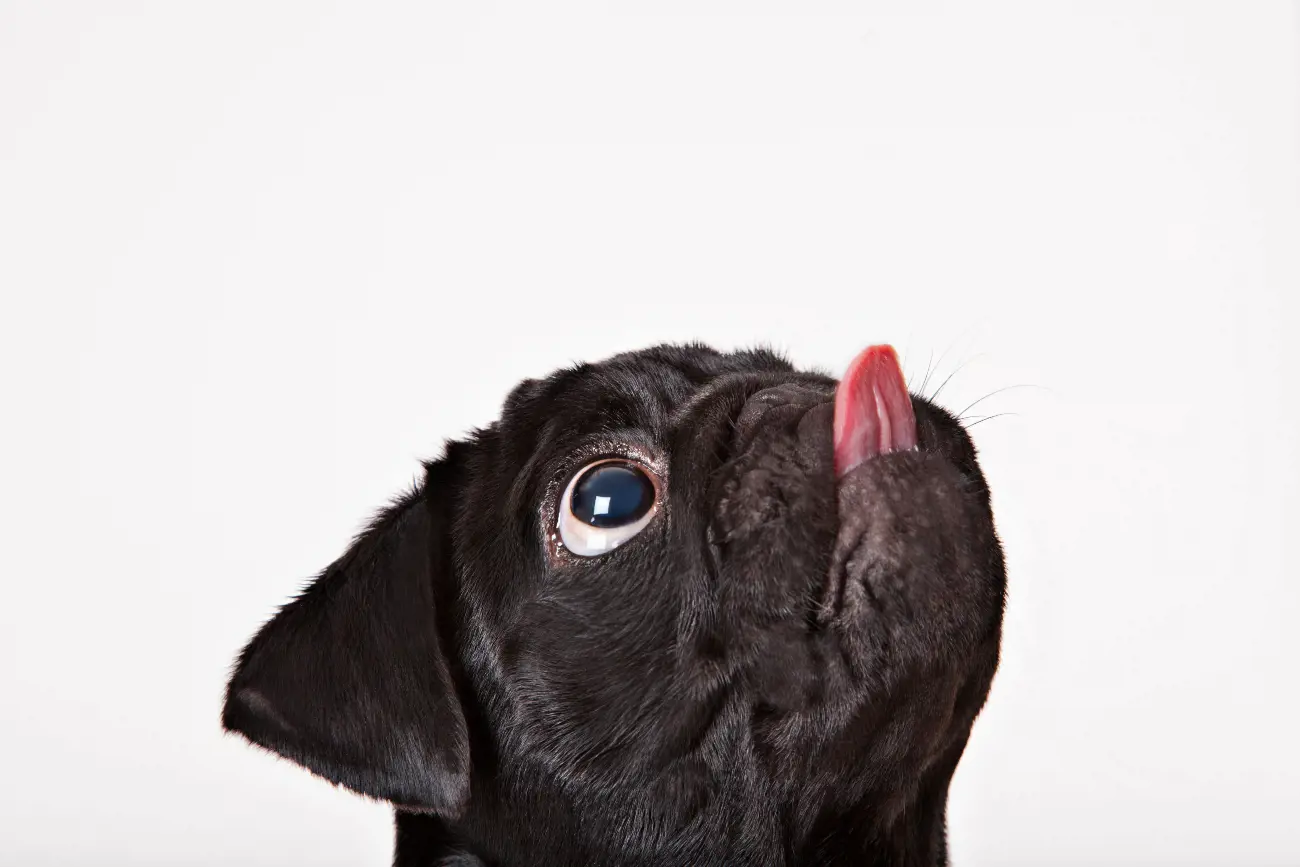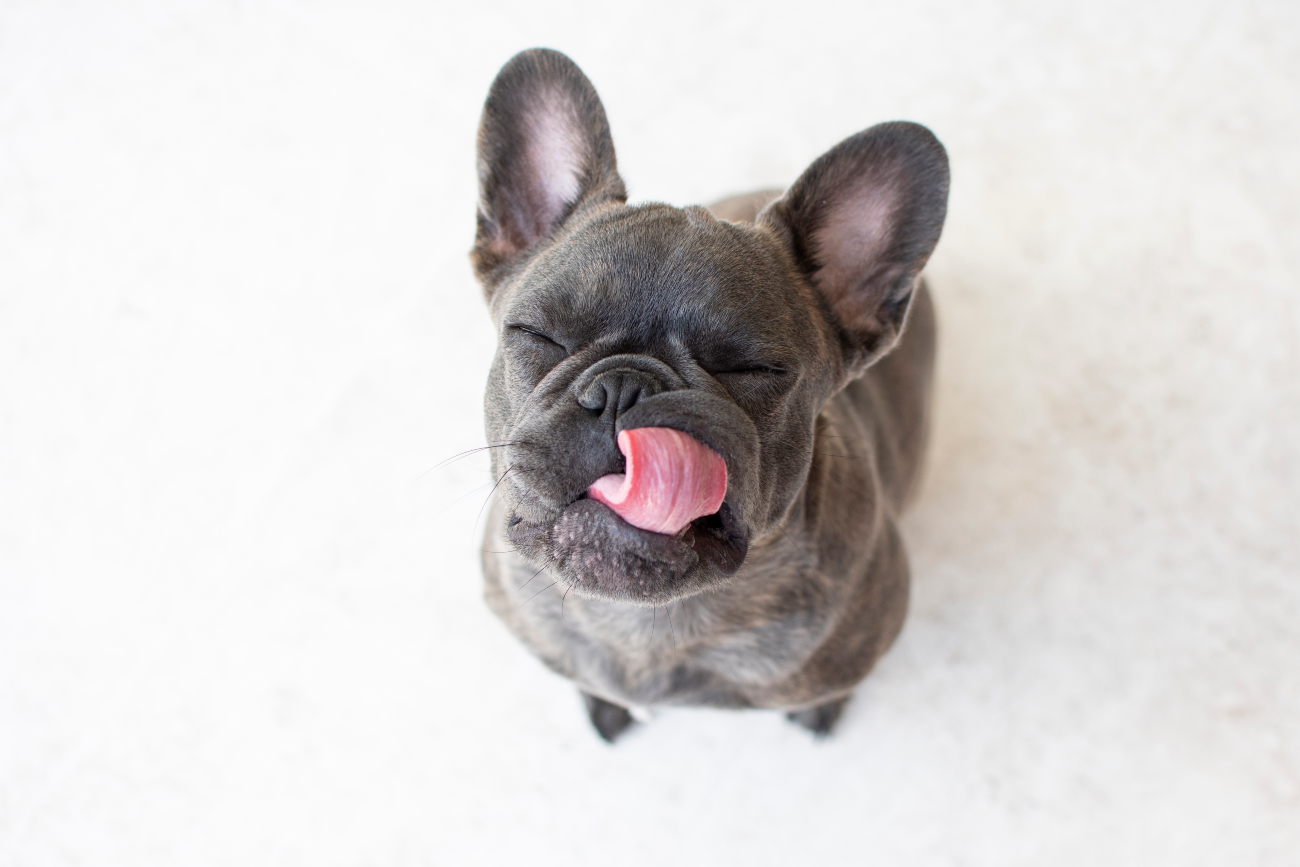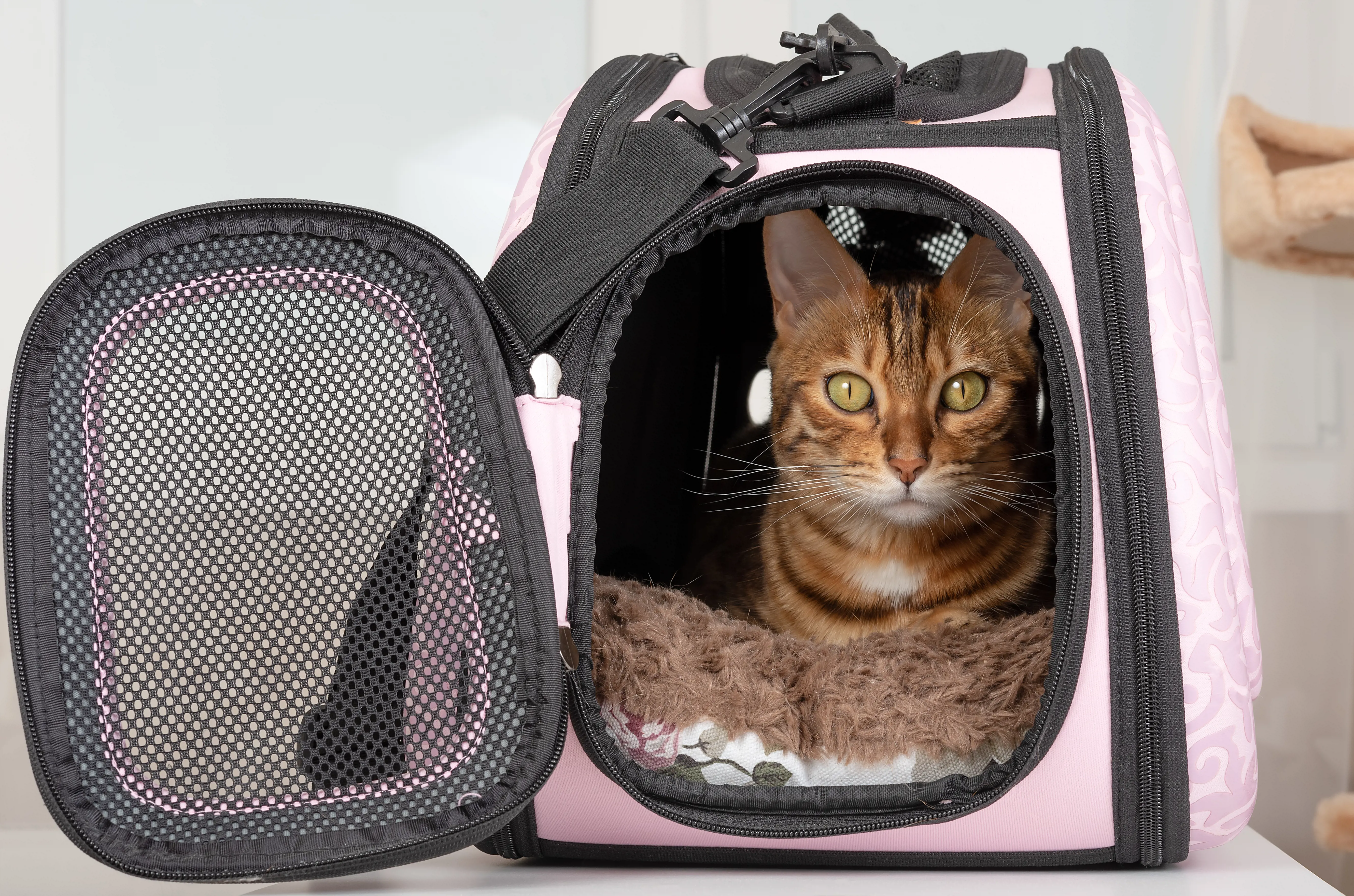Why do Pugs lick the air?
2nd October, 2024

Ever wondered why Pugs lick the air? It's a common behaviour that might leave you puzzled. There are various reasons behind this quirky habit that your pug displays.
Understanding the motivations behind their actions can help you better care for your furry friend. From sensory exploration to potential health concerns, there are several factors that could contribute to this behaviour.
By delving into the possible explanations for obsessive licking, you can gain insight into your pug's world and possibly find ways to address or redirect their air licking tendencies. So, let's explore the fascinating reasons why Pugs engage in this peculiar behaviour.
Key takeaways
- Pugs' heightened sense of smell and genetic influences play a significant role in their behaviour, including air licking.
- Health reasons and behavioural triggers, such as dental problems or anxiety, can lead to air licking in Pugs.
- Evolutionary roots and genetic makeup contribute to Pugs' instinctual behaviours like air licking.
- Professional guidance from a vet and behaviour modification plans may be necessary for addressing excessive or persistent air licking in Pugs if the root cause is determined to be due to behaviour and not health related.
Pugs' unique sensory perception
When you observe a pug licking the air, it's likely because of their unique sensory perception. Pugs have a heightened sense of smell due to their anatomical features.
The folds in their skin trap scents, and their short snouts make it easier for them to lick the air and bring these scents closer to their olfactory glands. This behaviour is their way of investigating and analysing the environment around them.
Pugs have a high concentration of scent receptors in their noses compared to other dog breeds. This abundance of nose scent receptors allows them to detect even the faintest of odours in the air. By licking the air, Pugs can gather more scent molecules, enhancing their ability to understand their surroundings better.
Therefore, next time you catch your pug licking the air, remember that it's not just a quirky habit but a way for them to make sense of the world through their exceptional sensory perception.
Possible health reasons for air licking
In relation to Pugs' unique sensory perception, you may wonder about the possible health reasons behind their air licking behaviour. While air licking is generally considered a harmless habit for Pugs, it can sometimes indicate underlying health issues that need attention. Here are some possible health reasons for air licking in Pugs:
| Health issue | Symptoms | Treatment |
| Dental problems | Bad breath, swollen gums | Regular dental check-ups |
| Gastrointestinal issues | Vomiting, diarrhoea | Dietary changes, vet consultation |
| Allergies | Itching, skin redness | Allergen avoidance, medication |
| Neurological disorders | Head tilting, seizures | Neurological evaluation, medication |
Behavioural triggers and associations
To understand Pugs' air licking behaviour, observe the triggers and associations that prompt this unique habit. Pugs may start licking the air due to various triggers, such as excitement, stress, or even anticipation of food.
For some Pugs, this behaviour might be associated with past experiences, like receiving treats or attention after air licking. It's essential to pay attention to your pug's surroundings and emotions to identify potential triggers.
In some cases, Pugs may lick the air as a way to communicate their needs or desires. For example, if a Pug licks the air before mealtime, it could be a learnt behaviour associated with hunger.
Similarly, if a pug is anxious or seeking comfort, they might engage in air licking as a self-soothing mechanism. Understanding these triggers and associations can help you better interpret your pug's behaviour and respond accordingly.
Instinctual and genetic influences
Pugs' unique breed characteristics, such as their short snouts and wrinkled faces, play a significant role in their instinctual behaviours. Understanding the evolutionary roots of air licking in Pugs can provide insights into why they exhibit this behaviour.
Factors like health issues or stress can also contribute to Pugs engaging in air licking.
Pug breed characteristics
When exploring pug breed characteristics, consider the instinctual and genetic influences that shape their behaviour. Pugs, with their unique traits, exhibit certain behaviours influenced by their genetic makeup and natural instincts:
- Brachycephalic features: Pugs' flat faces and short noses are genetic traits that can lead to respiratory issues, affecting their behaviour patterns.
- Companion dog instincts: Bred as companion animals, Pugs have a strong desire for human interaction, often displaying clingy behaviour.
- Playful and affectionate nature: Pugs are known for their playful and affectionate demeanour, traits that are deeply ingrained in their genetic predisposition.
Understanding these inherent characteristics can shed light on why Pugs behave in certain ways. This insight can also help explain the evolutionary behaviour explanations in the subsequent section.
Evolutionary behaviour explanations
With their distinctive genetic makeup and instinctual drives, Pugs' behaviour, including air licking, can be traced back to their evolutionary traits and inherent tendencies.
Pugs are descendants of ancient companion dogs that were bred for specific purposes, such as providing companionship and warmth to humans and their owners. These ancestral traits have been passed down through generations, influencing Pugs' behaviours today.
Air licking, in particular, may have roots in survival instincts from their ancestors. In the wild, dogs lick the air to gather scent molecules, which helps them analyse their surroundings and detect potential threats or prey.
This behaviour, although less essential in domestic settings, persists in Pugs as a remnant of their evolutionary past, showcasing the lasting impact of genetics and instincts on their actions.
Health or stress factors
Curiously, how might your Pug's air licking behaviour signal underlying health issues or stress, influenced by their instincts and genetics?
Health factors
- Dental problems: Air licking could indicate oral pain or discomfort, prompting the need for a dental examination.
- Gastrointestinal issues: Digestive problems may lead to excessive air licking as a response to nausea or stomach upset.
- Allergies: Pugs prone to allergies might lick the air due to skin irritation, itchiness, or respiratory distress.
Understanding your Pug's behaviour can help you address potential health concerns or stress triggers promptly. If they lick excessively or are accompanied by other unusual symptoms, consulting a veterinarian for a thorough evaluation is advisable.
Environmental factors and stimuli
When your pug licks the air, environmental factors like air quality might be influencing this behaviour. By analysing behavioural triggers, you can better understand why your Pug exhibits this peculiar habit.
Take note of your surroundings and see how they may be impacting your pug's actions.
Air quality influence
If you notice your Pug frequently licking the air, it could be due to factors related to the quality of the air around them. Here are some reasons why air quality might influence this behaviour:
- Scent detection: Pugs have a keen sense of smell and may be trying to gather information about their surroundings through scent.
- Irritants in the air: Your Pug could be reacting to irritants or allergens present in the air, prompting them to lick in an attempt to alleviate discomfort.
- Humidity levels: High humidity can sometimes lead to unusual behaviours in Pugs, including excessive licking of the air.
Transitioning into the subsequent section about 'behavioural triggers analysis', understanding these environmental factors can give insights into why your pug may exhibit certain behaviours.
Behavioural triggers analysis
As you observe your pug licking the air due to factors related to air quality, you can delve into analysing behavioural triggers stemming from environmental factors and stimuli.
Understanding these triggers can help you address your pug's behaviour effectively. Below is a table that outlines common environmental factors and stimuli that may influence your Pug's air licking behaviour:
| Environmental factor | Stimuli | Effects |
| Strong scents | Cleaning agents, perfumes | Intriguing smells can lead to air licking |
| Airborne particles | Dust, pollen | Irritation triggering licking |
| Indoor air quality | Humidity levels | Dry air might lead to excessive licking |
Ways to redirect or address the behaviour
To redirect or address the behaviour of air licking in Pugs, start by consistently offering appropriate dog chew toys. Pugs may lick the air due to boredom or anxiety, and providing them with suitable items to chew on can help redirect this behaviour.
Here are some additional ways to address air licking in Pugs:
- Engage in interactive play: Spend quality time engaging in interactive play sessions with your pug to keep them mentally stimulated and physically active.
- Provide mental stimulation: Offer puzzle toys or treat-dispensing toys to challenge your pug's mind and keep them occupied.
- Establish a routine: Create a consistent daily routine for your pug that includes regular feeding times, playtime, and walks to help reduce stress and anxiety.
By implementing these strategies, you can help kerb your Pug's air licking behaviour and provide them with healthier outlets for their energy and emotions.
Transitioning into the subsequent section about 'when to seek professional guidance,' remember that persistent or concerning behaviours may require the expertise of a professional veterinarian or animal behaviourist.
When to seek professional guidance
When considering seeking professional guidance for your dog's air licking behaviour, consult a veterinarian or animal behaviourist for expert advice and assistance. It's essential to seek professional help if your Pug's air licking behaviour is excessive, persistent, or causing distress to your pet.
Professional guidance can provide you with a deeper understanding of the underlying reasons for this behaviour and offer tailored solutions to address it effectively. A veterinarian can rule out any potential medical issues that might be causing your Pug to lick the air excessively.
An animal behaviourist can help you develop a behaviour modification plan to reduce or redirect your dog's air licking tendencies. These experts have the knowledge and experience to guide you through the process of understanding and managing your pug's behaviour in a safe and effective manner.
Seeking professional guidance early on can prevent the behaviour from escalating and ensure the well-being of your beloved pug.
Conclusion

In conclusion, whether it's due to their unique sensory perception, health reasons, or behavioural triggers, Pugs may lick the air for various reasons. Understanding the instinctual, genetic, and environmental factors at play can help address this behaviour. It is important to note that with a dog insurance policy, behavioural treatment will not be covered until the policy has been in force for 24 months.
By redirecting their focus and seeking professional guidance when needed, you can ensure your pug is happy and healthy. So next time you see your dog licking the air, remember to consider all the possible reasons behind their actions.
To get a Pug insurance quote for your furry friend you can get a quote through our website. If you would like to talk to one of our dog insurance team, you can get in touch with us on 0330 102 5748.
Frequently asked questions
Are Pugs more prone to lick the air compared to other dog breeds?
Pugs are known to be more prone to lick the air than some other breeds. This behaviour can be linked to various factors like genetics, health issues, or simply their quirky personalities. It's just a pug thing!
Can air licking behaviour in Pugs be a sign of a more serious underlying health issue?
If your Pug is frequently licking the air, it could be a sign of an underlying health issue. It's essential to observe any other unusual behaviours and consult a veterinarian for a proper diagnosis and treatment.
Is there a specific age range when Pugs are more likely to exhibit air licking behaviour?
As Pugs age, they may exhibit air-licking behaviour more frequently. This quirky habit often peaks between 1 to 3 years old, tapering off as they mature. It's fascinating how these little companions express themselves!
Are there certain environments or situations that may trigger Pugs to lick the air more frequently?
In certain environments or situations, Pugs might lick the air more often. Factors like stress, anxiety, or boredom can trigger this behaviour. Pay attention to your pug's surroundings and emotions to understand why they may be licking the air.
Can training or behaviour modification techniques effectively reduce or eliminate air licking behaviour in Pugs?
You can use training and behaviour modification techniques to effectively reduce or eliminate air licking behaviour in Pugs. Consistent positive reinforcement, redirecting their focus, and addressing any underlying anxiety or health issues may help kerb this habit.
Helpful Pages
Recent Posts

How to care for your pet in winter
26/11/25Pet Insurance Quote
- 98% claims paid *
- Claims paid directly to vets
- 24/7 vet video consultations
- Interest free monthly payments



